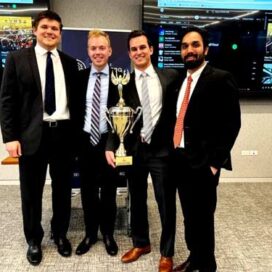NHL faces uncertain future
Published: January 21, 2005 / Author: David News
It’s no surprise that it took until mid-January for the back-to-back bargaining sessions that provided a short-lived glimmer of hope this week in the bitter battle between the NHL and its players.
It’s crunch time: The NHL must reach a deal over the next two weeks or risk earning a distinction it doesn’t want as the first professional sports league to lose an entire season to a labor dispute.
But even that might not be enough incentive to hammer out an agreement. Because bad as it would be, sports economists say, the end of the season wouldn’t necessarily be the end of the world.
“If I thought they could lose just a season and then reach a reasonable compromise next year, fine,” said Richard Sheehan, a finance professor at Notre Dame.
But, he said, all bets are off if the NHL differences remain unresolved a year from now.
“Losing this year, it may be the worst thing that’s ever happened to hockey, but it wouldn’t be a nuclear bomb exploding on the sport. Watching this year and next year go away, there’s your nuclear weapon,” said Sheehan, author of “Keeping Score: The Economics of Big-Time Sports.”
He isn’t the first to suggest the NHL’s labor dispute could drag on beyond one season.
Wayne Gretzky, an owner of the Phoenix Coyotes, has said he could see the fight stretching into a second season. Player agents are said to be talking with European teams about next fall.
If NHL brass are nervous about losing an entire season, they aren’t letting it show.
“We’ve always said that the most important thing is to do the right deal and see what flows from that,” said Bill Daly, the league’s chief negotiator, in an interview earlier this month in his New York office.
Sharks President Greg Jamison sees it similarly. “It would be nice to have a season for our fans,” he said. “However, it’s more important that we get the system fixed the right way for the San Jose Sharks and the league.”
The NHL will not set a deadline to salvage a “meaningful” season and playoffs. It won’t define “meaningful” — 40 games? 36? 24? — but it’s hard to see that happening if a deal isn’t in place by early February.
The over-arching problem has been lack of a middle ground — and trust.
Owners are insisting on “cost certainty,” a salary cap that limits player salaries to a fixed percentage of revenue. Players offered to give back 24 percent of their pay and make adjustments to limit future increases, but won’t accept a salary cap.
Both sides, Daly acknowledged in the interview, have drawn lines and refused to cross them.
“Essentially we’ve played on their side of the line for 10 years with disastrous results,” Daly said in explaining the league’s perspective. “What we’re asking them to do is play on our side of the line for the length of a new agreement and at least see where that takes us.”
Efforts to discuss the situation with NHLPA officials were unsuccessful. The union has said that poor management, not the expired bargaining agreement, was responsible for the league’s money woes.
Both sides are prepared for an extended lockout. The owners established a $300 million strike fund to help franchises in need. The union created a fund from which players can draw up to $10,000 a month.
Still, there are millions of reasons for making a deal.
Players are sacrificing salaries that would average, even under the owners’ proposal, $1.3 million. And owners could be worrying about the declining value of their franchises.
Daly said he realizes the dispute has had a ripple effect on the economy in the NHL’s 30 cities, too. Some restaurant employees in downtown San Jose, for example, are working fewer shifts this year.
“But what we’re fighting for is for the preservation of those shifts and those jobs over the long term,” Daly said.
Notre Dame’s Sheehan said the idea of enduring short-term pain for long-term strength is flawed.
“If the owners are interested in simply breaking the union, yes, that may be a reasonable strategy, but if their strategy is to coexist with them, then it’s not clear that’s reasonable,” Sheehan said.
“When I look at sports, there are always two issues on the table. One is how much money are you going to make, and the second issue is, are you going to win the negotiations? In this case, the question is do you want to win and beat the other side into submission or do you want to make money and work with the other side?”
If the sides cannot reach an agreement soon, many suggest the NHL will simply let the season trickle away rather than make an official announcement and take the public-relations hit sure to follow.
However things play out, said Paul Staudohar, professor of business administration at Cal State-Hayward, the next two weeks are crucial.
“To use a hockey analogy,” said Staudohar, author of “Playing for Dollars — Labor Relations and the Sports Business,” “they’re in sudden-death overtime and both sides stand to lose if they can’t get it done over the next few days.”
/news_and_events/news_articles/article/3773/nhl-faces-uncertain-future
Related Stories




